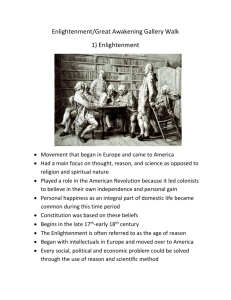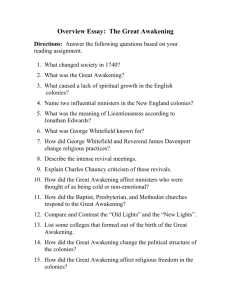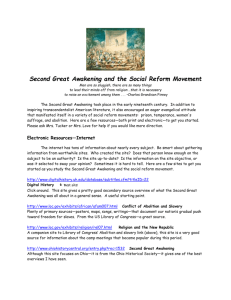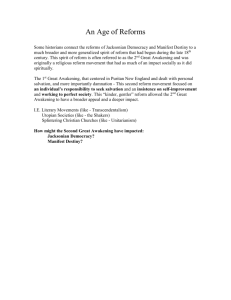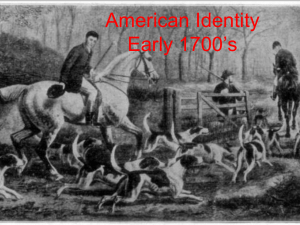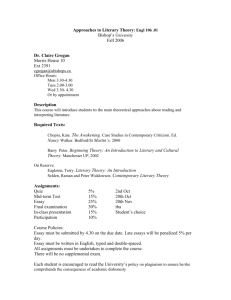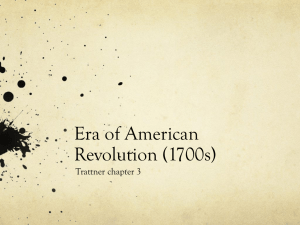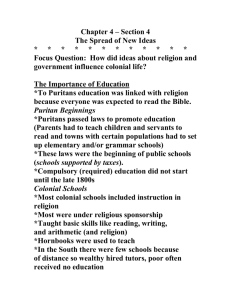Topic of Discussion – The Great Awakening
advertisement
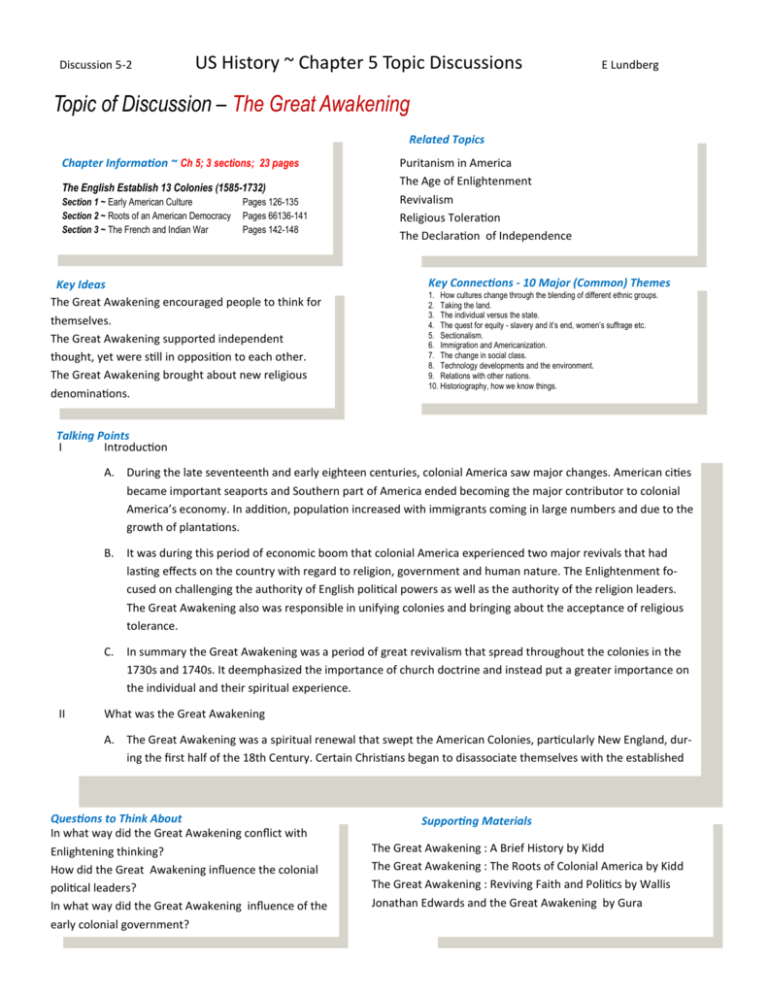
Discussion 5-2 US History ~ Chapter 5 Topic Discussions E Lundberg Topic of Discussion – The Great Awakening Related Topics Chapter Information ~ Ch 5; 3 sections; 23 pages The English Establish 13 Colonies (1585-1732) Section 1 ~ Early American Culture Section 2 ~ Roots of an American Democracy Section 3 ~ The French and Indian War Pages 126-135 Pages 66136-141 Pages 142-148 Key Ideas The Great Awakening encouraged people to think for themselves. The Great Awakening supported independent thought, yet were still in opposition to each other. The Great Awakening brought about new religious denominations. Puritanism in America The Age of Enlightenment Revivalism Religious Toleration The Declaration of Independence Key Connections - 10 Major (Common) Themes 1. How cultures change through the blending of different ethnic groups. 2. Taking the land. 3. The individual versus the state. 4. The quest for equity - slavery and it’s end, women’s suffrage etc. 5. Sectionalism. 6. Immigration and Americanization. 7. The change in social class. 8. Technology developments and the environment. 9. Relations with other nations. 10. Historiography, how we know things. Talking Points I Introduction A. During the late seventeenth and early eighteen centuries, colonial America saw major changes. American cities became important seaports and Southern part of America ended becoming the major contributor to colonial America’s economy. In addition, population increased with immigrants coming in large numbers and due to the growth of plantations. II B. It was during this period of economic boom that colonial America experienced two major revivals that had lasting effects on the country with regard to religion, government and human nature. The Enlightenment focused on challenging the authority of English political powers as well as the authority of the religion leaders. The Great Awakening also was responsible in unifying colonies and bringing about the acceptance of religious tolerance. C. In summary the Great Awakening was a period of great revivalism that spread throughout the colonies in the 1730s and 1740s. It deemphasized the importance of church doctrine and instead put a greater importance on the individual and their spiritual experience. What was the Great Awakening A. The Great Awakening was a spiritual renewal that swept the American Colonies, particularly New England, during the first half of the 18th Century. Certain Christians began to disassociate themselves with the established Questions to Think About In what way did the Great Awakening conflict with Enlightening thinking? How did the Great Awakening influence the colonial political leaders? In what way did the Great Awakening influence of the early colonial government? Supporting Materials The Great Awakening : A Brief History by Kidd The Great Awakening : The Roots of Colonial America by Kidd The Great Awakening : Reviving Faith and Politics by Wallis Jonathan Edwards and the Great Awakening by Gura Discussion 5-2 US History ~ Chapter 5 Topic Discussions E Lundberg Topic of Discussion – The Great Awakening Related Topics Chapter Information ~ Ch 5; 3 sections; 23 pages The English Establish 13 Colonies (1585-1732) Section 1 ~ Early American Culture Section 2 ~ Roots of an American Democracy Section 3 ~ The French and Indian War Pages 126-135 Pages 66136-141 Pages 142-148 Key Ideas The Great Awakening encouraged people to think for themselves. The Great Awakening supported independent thought, yet were still in opposition to each other. The Great Awakening brought about new religious denominations. Puritanism in America The Age of Enlightenment Revivalism Religious Toleration The Declaration of Independence Key Connections - 10 Major (Common) Themes 1. How cultures change through the blending of different ethnic groups. 2. Taking the land. 3. The individual versus the state. 4. The quest for equity - slavery and it’s end, women’s suffrage etc. 5. Sectionalism. 6. Immigration and Americanization. 7. The change in social class. 8. Technology developments and the environment. 9. Relations with other nations. 10. Historiography, how we know things. Talking Points approach to worship at the time which had led to a general sense of complacency among believers, and instead they adopted an approach which was characterized by great fervor and emotion in prayer. This new spiritual renewal began with people like the Wesley brothers and George Whitefield in England and crossed over to the American Colonies during the first half of the 18th Century. Unlike the somber, largely Puritan spirituality of the early 1700s, the revivalism ushered in by the Awakening allowed people to express their emotions more overtly in order to feel a greater intimacy with God. III What Caused the Great Awakening? A. In late 17th Century England, fighting between religious and political groups came to a halt with the Glorious Revolution of 1688, an event which established the Church of England as the reigning church of the country. Other religions, such as Catholicism, Judaism, and Puritanism, were subsequently suppressed. B. From a political perspective, this led to stability since everyone now practiced the same religion. But instead of being a positive driving force for religious belief in general, it created complacency and spiritual “dryness” among believers. Religion became something of a pastime in which people would “go through the motions” during religious services without deeply-felt convictions of the heart and soul. It was only after some decades of this kind of complacency in both England and the American colonies that the spiritual “revival” of the Great Awakening came about. Questions to Think About In what way did the Great Awakening conflict with Enlightening thinking? How did the Great Awakening influence the colonial political leaders? In what way did the Great Awakening influence of the early colonial government? Supporting Materials The Great Awakening : A Brief History by Kidd The Great Awakening : The Roots of Colonial America by Kidd The Great Awakening : Reviving Faith and Politics by Wallis Jonathan Edwards and the Great Awakening by Gura Discussion 5-2 US History ~ Chapter 5 Topic Discussions E Lundberg Topic of Discussion – The Great Awakening Related Topics Chapter Information ~ Ch 5; 3 sections; 23 pages The English Establish 13 Colonies (1585-1732) Section 1 ~ Early American Culture Section 2 ~ Roots of an American Democracy Section 3 ~ The French and Indian War Pages 126-135 Pages 66136-141 Pages 142-148 Key Ideas The Great Awakening encouraged people to think for themselves. The Great Awakening supported independent thought, yet were still in opposition to each other. The Great Awakening brought about new religious denominations. Puritanism in America The Age of Enlightenment Revivalism Religious Toleration The Declaration of Independence Key Connections - 10 Major (Common) Themes 1. How cultures change through the blending of different ethnic groups. 2. Taking the land. 3. The individual versus the state. 4. The quest for equity - slavery and it’s end, women’s suffrage etc. 5. Sectionalism. 6. Immigration and Americanization. 7. The change in social class. 8. Technology developments and the environment. 9. Relations with other nations. 10. Historiography, how we know things. Talking Points C. In summary, the Great Awakening arose at a time when man in Europe and the American colonies were questioning the role of the individual in religion and society. It began at the same time as the Enlightenment which emphasized logic and reason and stressed the power of the individual to understand the universe based on scientific laws. Similarly, individuals grew to rely more on a personal approach to salvation than church dogma and doctrine. IV What were the effects of the Great Awakening? A. The Awakening’s biggest significance was the way it prepared America for its War of Independence. In the decades before the war, revivalism taught people that they could be bold when confronting religious authority, and that when churches weren’t living up to the believers’ expectations, the people could break off and form new ones. B. Through the Awakening, the Colonists realized that religious power resided in their own hands, rather than in the hands of the Church of England, or any other religious authority. After a generation or two passed with this kind of mindset, the Colonists came to realize that political power did not reside in the hands of the English monarch, but in their own will for self-governance (consider the wording of the Declaration of Independence). By 1775, even though the Colonists did not all share the same theological beliefs, they did share a common vision of freedom from British control. Thus, the Great Awakening brought about a climate which made the American Revolution possible. Questions to Think About In what way did the Great Awakening conflict with Enlightening thinking? How did the Great Awakening influence the colonial political leaders? In what way did the Great Awakening influence of the early colonial government? Supporting Materials The Great Awakening : A Brief History by Kidd The Great Awakening : The Roots of Colonial America by Kidd The Great Awakening : Reviving Faith and Politics by Wallis Jonathan Edwards and the Great Awakening by Gura Discussion 5-2 US History ~ Chapter 5 Topic Discussions E Lundberg Topic of Discussion – The Great Awakening Related Topics Chapter Information ~ Ch 5; 3 sections; 23 pages The English Establish 13 Colonies (1585-1732) Section 1 ~ Early American Culture Section 2 ~ Roots of an American Democracy Section 3 ~ The French and Indian War Pages 126-135 Pages 66136-141 Pages 142-148 Key Ideas The Great Awakening encouraged people to think for themselves. The Great Awakening supported independent thought, yet were still in opposition to each other. The Great Awakening brought about new religious denominations. Puritanism in America The Age of Enlightenment Revivalism Religious Toleration The Declaration of Independence Key Connections - 10 Major (Common) Themes 1. How cultures change through the blending of different ethnic groups. 2. Taking the land. 3. The individual versus the state. 4. The quest for equity - slavery and it’s end, women’s suffrage etc. 5. Sectionalism. 6. Immigration and Americanization. 7. The change in social class. 8. Technology developments and the environment. 9. Relations with other nations. 10. Historiography, how we know things. Talking Points V Origins of the Great Awakening A. The causes of the Great Awakening can be traced back to seventeenth-century England, where the political climate led to a decrease in spirituality among English citizens. With the death of the Puritan Oliver Cromwell in 1658, the Anglican Charles II assumed the throne and the majority of citizens welcomed him with open arms. Charles attempted to erase all influences of Puritanism in his court, even to the point of exhuming Cromwell’s body from its grave for all to see. B. The Puritans had previously grown in number in England as a reaction to the perceived corruption and secularism of the Church of England, and now they were being pushed back from avenues of power within renewed monarchical England. Catholics formed a small minority in England, but they had some powerful allies. Charles was sympathetic to Catholic concerns; in 1670 he and Louis XIV agreed to the Treaty of Dover, in which Charles clandestinely agreed to join the French to oppose Holland and also to bring Roman Catholicism back to England. The next king after Charles, James II, was a Catholic. C. Then with the Glorious Revolution of 1688 came the banishment by William and Mary of all clergy who refused to transfer allegiance away from James II. Whiggish political thought denounced divine right of kings and complacent obedience, and much of the Anglican clergy easily accepted allegiance to the new monarchs. Questions to Think About In what way did the Great Awakening conflict with Enlightening thinking? How did the Great Awakening influence the colonial political leaders? In what way did the Great Awakening influence of the early colonial government? Supporting Materials The Great Awakening : A Brief History by Kidd The Great Awakening : The Roots of Colonial America by Kidd The Great Awakening : Reviving Faith and Politics by Wallis Jonathan Edwards and the Great Awakening by Gura Discussion 5-2 US History ~ Chapter 5 Topic Discussions E Lundberg Topic of Discussion – The Great Awakening Related Topics Chapter Information ~ Ch 5; 3 sections; 23 pages The English Establish 13 Colonies (1585-1732) Section 1 ~ Early American Culture Section 2 ~ Roots of an American Democracy Section 3 ~ The French and Indian War Pages 126-135 Pages 66136-141 Pages 142-148 Key Ideas The Great Awakening encouraged people to think for themselves. The Great Awakening supported independent thought, yet were still in opposition to each other. The Great Awakening brought about new religious denominations. Puritanism in America The Age of Enlightenment Revivalism Religious Toleration The Declaration of Independence Key Connections - 10 Major (Common) Themes 1. How cultures change through the blending of different ethnic groups. 2. Taking the land. 3. The individual versus the state. 4. The quest for equity - slavery and it’s end, women’s suffrage etc. 5. Sectionalism. 6. Immigration and Americanization. 7. The change in social class. 8. Technology developments and the environment. 9. Relations with other nations. 10. Historiography, how we know things. Talking Points D. The clergy gravitated away from the doctrinal extremes and tended to follow a more moderate path. These moves served to cut off the fiery and crusading elements of the Church of England, thereby creating a dismal spiritual existence for those remaining. As one clergyman put it: E. It is come, I know not how, to be taken for granted, by many persons, that Christianity is not so much as a subject of inquiry; but that it is, not at length, discovered to be fictitious. And accordingly they treat it, as if, in the present age, this were an agreed point among all people of discernment; and nothing remained, but to set it up as a principal subject of mirth and ridicule, as it were by way of reprisals, for its having so long interrupted the pleasures of the world. F. This religious complacency occurred during the post-revolution years which gave England a period of good feelings for most as well as a sense of national superiority. The government was satisfied with itself, as minority religious groups – such as Jews, Catholics, and Unitarians – were suppressed through severe punishments. G. Meanwhile, the colonists welcomed the 1688 revolution and the restoration of rights they thought it would bring to England and her colonies. The colonists shared their motherland’s fear of Catholic and Stuart control, and were happy with what was to be the spread of the ideals of the Whigs to the New World. The vision of the colonists soon proved wrong, however, as strict centralized rule over the colonies continued under many of the same policies that governed the land prior to the revolution. Questions to Think About In what way did the Great Awakening conflict with Enlightening thinking? How did the Great Awakening influence the colonial political leaders? In what way did the Great Awakening influence of the early colonial government? Supporting Materials The Great Awakening : A Brief History by Kidd The Great Awakening : The Roots of Colonial America by Kidd The Great Awakening : Reviving Faith and Politics by Wallis Jonathan Edwards and the Great Awakening by Gura Discussion 5-2 US History ~ Chapter 5 Topic Discussions E Lundberg Topic of Discussion – The Great Awakening Related Topics Chapter Information ~ Ch 5; 3 sections; 23 pages Puritanism in America The Age of Enlightenment Revivalism Religious Toleration The Declaration of Independence The English Establish 13 Colonies (1585-1732) Section 1 ~ Early American Culture Section 2 ~ Roots of an American Democracy Section 3 ~ The French and Indian War Pages 126-135 Pages 66136-141 Pages 142-148 Key Connections - 10 Major (Common) Themes Key Ideas The Great Awakening encouraged people to think for themselves. The Great Awakening supported independent thought, yet were still in opposition to each other. The Great Awakening brought about new religious denominations. 1. How cultures change through the blending of different ethnic groups. 2. Taking the land. 3. The individual versus the state. 4. The quest for equity - slavery and it’s end, women’s suffrage etc. 5. Sectionalism. 6. Immigration and Americanization. 7. The change in social class. 8. Technology developments and the environment. 9. Relations with other nations. 10. Historiography, how we know things. Talking Points H. Then, near the turn of the century, Charles and John Wesley underwent interior transformations in which they gained an understanding of Christian faith apart from mere nominal participation in their religion; from this spawned Methodist groups centered on personal significance of the gospels. The Wesleys, along with characters such as George Whitefield, formed the revivalist movement in England which reacted against the coldness of religion and the deistic rationalism which prevailed at the beginning of the 18th Century. VI Significance of the Great Awakening: Roots of Revolution A. The major effect of the Awakening was a rebellion against authoritarian religious rule which spilled over into other areas of colonial life. Amidst the growing population of the colonies within the 18th Century and mass public gatherings, charismatic personalities such as Whitefield and Tennent rolled through to deliver their messages. Though a religious movement, the Awakening had repercussions in cultural and political spheres as well. Customs of civility and courtesy, the governing norms of life in the colonies, were set aside in favor of a more quarrelsome age. Practices and mind-sets were changed by the Awakening like never before. VII Towards an American Identity A. Revivalism in the colonies did not form around a complex theology of religious freedom, but nevertheless the ideas it produced opposed the notion of a single truth or a single church. As preachers visited town after town, Questions to Think About In what way did the Great Awakening conflict with Enlightening thinking? How did the Great Awakening influence the colonial political leaders? In what way did the Great Awakening influence of the early colonial government? Supporting Materials The Great Awakening : A Brief History by Kidd The Great Awakening : The Roots of Colonial America by Kidd The Great Awakening : Reviving Faith and Politics by Wallis Jonathan Edwards and the Great Awakening by Gura Discussion 5-2 US History ~ Chapter 5 Topic Discussions E Lundberg Topic of Discussion – The Great Awakening Related Topics Chapter Information ~ Ch 5; 3 sections; 23 pages The English Establish 13 Colonies (1585-1732) Section 1 ~ Early American Culture Section 2 ~ Roots of an American Democracy Section 3 ~ The French and Indian War Pages 126-135 Pages 66136-141 Pages 142-148 Key Ideas The Great Awakening encouraged people to think for themselves. The Great Awakening supported independent thought, yet were still in opposition to each other. The Great Awakening brought about new religious denominations. Puritanism in America The Age of Enlightenment Revivalism Religious Toleration The Declaration of Independence Key Connections - 10 Major (Common) Themes 1. How cultures change through the blending of different ethnic groups. 2. Taking the land. 3. The individual versus the state. 4. The quest for equity - slavery and it’s end, women’s suffrage etc. 5. Sectionalism. 6. Immigration and Americanization. 7. The change in social class. 8. Technology developments and the environment. 9. Relations with other nations. 10. Historiography, how we know things. Talking Points sects began to break off larger churches and a multitude of Protestant denominations sprouted. The older groups that dominated the early colonies – the Puritans and the Anglicans – eventually began a drastic downward trend in popularity. Although they accounted for about 40% of American congregations as late as 1760, that number eventually dropped to under 2.5% by 1790. B. The social effect of multitudes of new denominations was not, however, a fracturing of communities, but a unifying drive which helped to create a “national consciousness”. C. The effect of Great Awakening unity was an attitude that went against the deferential thinking that consumed English politics and religion. Rather than believing that God’s will was necessarily interpreted by the monarch or his bishops, the colonists viewed themselves as more capable of performing the task. The chain of authority no longer ran from God to ruler to people, but from God to people to ruler. The children of revivalism later echoed this radicalism and popular self-righteousness in the American Revolution, when self-assertion turned against the tyrannical ways of George III. It was not to any church that the signers of the Declaration of Independence appealed to, but directly to the “Supreme Judge of the World”. It was through the revivalism of the first half of the Eighteenth Century that the colonists were finally able to step out from under the protectorate of the established Christian churches and assert religious control over their own nation’s destiny. D. In the mid-1700s, the colonies saw many spiritual and religious revivals. This led to common views being shared Questions to Think About In what way did the Great Awakening conflict with Enlightening thinking? How did the Great Awakening influence the colonial political leaders? In what way did the Great Awakening influence of the early colonial government? Supporting Materials The Great Awakening : A Brief History by Kidd The Great Awakening : The Roots of Colonial America by Kidd The Great Awakening : Reviving Faith and Politics by Wallis Jonathan Edwards and the Great Awakening by Gura Discussion 5-2 US History ~ Chapter 5 Topic Discussions E Lundberg Topic of Discussion – The Great Awakening Related Topics Chapter Information ~ Ch 5; 3 sections; 23 pages The English Establish 13 Colonies (1585-1732) Section 1 ~ Early American Culture Section 2 ~ Roots of an American Democracy Section 3 ~ The French and Indian War Pages 126-135 Pages 66136-141 Pages 142-148 Key Ideas The Great Awakening encouraged people to think for themselves. The Great Awakening supported independent thought, yet were still in opposition to each other. The Great Awakening brought about new religious denominations. Puritanism in America The Age of Enlightenment Revivalism Religious Toleration The Declaration of Independence Key Connections - 10 Major (Common) Themes 1. How cultures change through the blending of different ethnic groups. 2. Taking the land. 3. The individual versus the state. 4. The quest for equity - slavery and it’s end, women’s suffrage etc. 5. Sectionalism. 6. Immigration and Americanization. 7. The change in social class. 8. Technology developments and the environment. 9. Relations with other nations. 10. Historiography, how we know things. Talking Points by the North and South and faith was preached across races. Most evangelists ended up condemning slavery as a sin. In fact, at the first general conference of Methodism, it was decreed that having a slave would lead to immediate expulsion. E. VIII The movement fulfilled people’s need for reassurance, direction and religious purpose, which otherwise was missing. People united in the understanding of the Christian faith and life. However, the Great Awakening ended up weakening the importance of clergy as believers started relying on their own conclusions. The movement also led to creation of different sects and denominations, and advocated religious tolerance. This movement saw traditional authority of the clergy being challenged and eventually it made it easier to challenge the authority of the King. Government as Contract A. Another effect of the Great Awakening on colonial culture was the growth of the notion of state rule as a contract with the people. B. Parishioners during the revival gained an understanding of covenants with their churches as contractual schemes; they argued that each believer owed the church their obedience, and the churches in turn owed their congregants the duty to be faithful to the Gospel. Parishioners therefore reserved the right to dissolve the cove- Questions to Think About In what way did the Great Awakening conflict with Enlightening thinking? How did the Great Awakening influence the colonial political leaders? In what way did the Great Awakening influence of the early colonial government? Supporting Materials The Great Awakening : A Brief History by Kidd The Great Awakening : The Roots of Colonial America by Kidd The Great Awakening : Reviving Faith and Politics by Wallis Jonathan Edwards and the Great Awakening by Gura Discussion 5-2 US History ~ Chapter 5 Topic Discussions E Lundberg Topic of Discussion – The Great Awakening Related Topics Chapter Information ~ Ch 5; 3 sections; 23 pages The English Establish 13 Colonies (1585-1732) Section 1 ~ Early American Culture Section 2 ~ Roots of an American Democracy Section 3 ~ The French and Indian War Pages 126-135 Pages 66136-141 Pages 142-148 Key Ideas The Great Awakening encouraged people to think for themselves. The Great Awakening supported independent thought, yet were still in opposition to each other. The Great Awakening brought about new religious denominations. Puritanism in America The Age of Enlightenment Revivalism Religious Toleration The Declaration of Independence Key Connections - 10 Major (Common) Themes 1. How cultures change through the blending of different ethnic groups. 2. Taking the land. 3. The individual versus the state. 4. The quest for equity - slavery and it’s end, women’s suffrage etc. 5. Sectionalism. 6. Immigration and Americanization. 7. The change in social class. 8. Technology developments and the environment. 9. Relations with other nations. 10. Historiography, how we know things. Talking Points nant and to sever ties with the church without prior permission. This notion of covenant was a popular one in Puritan society and reflected a common biblical understanding of association. Present in the Mayflower Compact and later forming an ideological basis for breaking from Great Britain, the notion of covenant grew to link religion and politics in the colonies. C. The ideals of Puritanical covenant theology were manifested in the “social compact” of the Declaration of Independence. D. Under this theory, implicit in the Declaration, disassociated individuals in the “state of nature” agree to live and be bound together under consensual government. With the frequency by which believers broke away from larger churches to form splinter groups, the colonists must have been accustomed to separating themselves from larger institutions. IX Religious Uniformity A. Perhaps the greatest fuel added to the revolutionary fire that began burning in the latter half of the 18th Century was religious pluralism within the colonies. Unlike England, which after the Glorious Revolution of 1688 had become spiritually stagnant under the Church of England, the colonists adhered to no single denomination. The splits in churches that revivalism had caused prevented uniformity in religion from becoming a reality. While Questions to Think About In what way did the Great Awakening conflict with Enlightening thinking? How did the Great Awakening influence the colonial political leaders? In what way did the Great Awakening influence of the early colonial government? Supporting Materials The Great Awakening : A Brief History by Kidd The Great Awakening : The Roots of Colonial America by Kidd The Great Awakening : Reviving Faith and Politics by Wallis Jonathan Edwards and the Great Awakening by Gura Discussion 5-2 US History ~ Chapter 5 Topic Discussions E Lundberg Topic of Discussion – The Great Awakening Related Topics Chapter Information ~ Ch 5; 3 sections; 23 pages The English Establish 13 Colonies (1585-1732) Section 1 ~ Early American Culture Section 2 ~ Roots of an American Democracy Section 3 ~ The French and Indian War Pages 126-135 Pages 66136-141 Pages 142-148 Key Ideas The Great Awakening encouraged people to think for themselves. The Great Awakening supported independent thought, yet were still in opposition to each other. The Great Awakening brought about new religious denominations. Puritanism in America The Age of Enlightenment Revivalism Religious Toleration The Declaration of Independence Key Connections - 10 Major (Common) Themes 1. How cultures change through the blending of different ethnic groups. 2. Taking the land. 3. The individual versus the state. 4. The quest for equity - slavery and it’s end, women’s suffrage etc. 5. Sectionalism. 6. Immigration and Americanization. 7. The change in social class. 8. Technology developments and the environment. 9. Relations with other nations. 10. Historiography, how we know things. Talking Points groups such as the Quakers and Anglicans still existed in areas, none could rise to dominate the religious scene and become the primary American religion. So long as the colonists did not become complacent, their religious zeal would continue to burn strong. X B. Eventually, this religious zeal turned to revolution and sentiments of self-governance. That the religious spirit of the colonists was a necessary component to the drive for independence is confirmed in the sentiments of those who lived during the period of fighting. As British statesman William Knox noted about the American drive for independence, “Every man being thus allowed to be his own Pope, he becomes disposed to wish to become his own King”. C. John Adams gave credit to the Great Awakening as the source of motivation behind the war, and in certain parts of England the revolution was even called the “Presbyterian Rebellion”. Shared Goals A. The religious revival of the Great Awakening melded the colonists in a way that would not have been possible otherwise. Eighteenth Century Americans thought of religion as something communitarian – a form of social cooperation – rather than a competitive endeavor of individuals that the world of commerce envisioned. Christians were told to be benevolent and to make self-sacrifices, and many were bound together by way of their shared mass conversions. Thus, they could afford to make sacrifices for their land in times of need. Questions to Think About In what way did the Great Awakening conflict with Enlightening thinking? How did the Great Awakening influence the colonial political leaders? In what way did the Great Awakening influence of the early colonial government? Supporting Materials The Great Awakening : A Brief History by Kidd The Great Awakening : The Roots of Colonial America by Kidd The Great Awakening : Reviving Faith and Politics by Wallis Jonathan Edwards and the Great Awakening by Gura Discussion 5-2 US History ~ Chapter 5 Topic Discussions E Lundberg Topic of Discussion – The Great Awakening Related Topics Chapter Information ~ Ch 5; 3 sections; 23 pages The English Establish 13 Colonies (1585-1732) Section 1 ~ Early American Culture Section 2 ~ Roots of an American Democracy Section 3 ~ The French and Indian War Pages 126-135 Pages 66136-141 Pages 142-148 Key Ideas The Great Awakening encouraged people to think for themselves. The Great Awakening supported independent thought, yet were still in opposition to each other. The Great Awakening brought about new religious denominations. Puritanism in America The Age of Enlightenment Revivalism Religious Toleration The Declaration of Independence Key Connections - 10 Major (Common) Themes 1. How cultures change through the blending of different ethnic groups. 2. Taking the land. 3. The individual versus the state. 4. The quest for equity - slavery and it’s end, women’s suffrage etc. 5. Sectionalism. 6. Immigration and Americanization. 7. The change in social class. 8. Technology developments and the environment. 9. Relations with other nations. 10. Historiography, how we know things. Talking Points B. Another shared sentiment of the chiefly Protestant nation was a fear of Catholic domination. While this feeling may have been contributed to by fear of foreign political domination, the revivalist zeal of the colonists no doubt played a part in the anti-hierarchical nature of anti-Catholic attitudes. Through cataclysmic events such as world earthquakes in 1727 and 1755, expectations of the new millennial age increased. The colonists viewed these as divine signs, and so when questions arose about the Antichrist they turned to the Catholics. They considered the pope to be the enemy during the French and Indian War, and celebrations in Boston and in other places, Anti-Pope Day furthered Protestant zeal. C. Anti-Catholicism was one of the most prominent traits in the colonies prior to the revolution. This attitude was significant in the New England way of life and existed not only in the churches but also in taverns, newspapers, and schools. Despite political or theological differences between colonists, one common understanding shared by all was an opposition to Roman Catholicism. So when the “popish” threat subsided somewhat with the passing of the French and Indian War, the colonists searched for a new Antichrist at which they could direct their attention. They found him in George III, who needed to be expelled from the colonies in order to bring forth the new age of righteousness. The religious fervor spawned by the Great Awakening provided the catalyst for political and military action necessary for fulfillment of religious expectations. The crusade against the Catholics provided the necessary focal point over the course of the 18th Century until the new crusade against the British took over. Questions to Think About In what way did the Great Awakening conflict with Enlightening thinking? How did the Great Awakening influence the colonial political leaders? In what way did the Great Awakening influence of the early colonial government? Supporting Materials The Great Awakening : A Brief History by Kidd The Great Awakening : The Roots of Colonial America by Kidd The Great Awakening : Reviving Faith and Politics by Wallis Jonathan Edwards and the Great Awakening by Gura Discussion 5-2 US History ~ Chapter 5 Topic Discussions E Lundberg Topic of Discussion – The Great Awakening Related Topics Chapter Information ~ Ch 5; 3 sections; 23 pages The English Establish 13 Colonies (1585-1732) Section 1 ~ Early American Culture Section 2 ~ Roots of an American Democracy Section 3 ~ The French and Indian War Pages 126-135 Pages 66136-141 Pages 142-148 Key Ideas The Great Awakening encouraged people to think for themselves. The Great Awakening supported independent thought, yet were still in opposition to each other. The Great Awakening brought about new religious denominations. Puritanism in America The Age of Enlightenment Revivalism Religious Toleration The Declaration of Independence Key Connections - 10 Major (Common) Themes 1. How cultures change through the blending of different ethnic groups. 2. Taking the land. 3. The individual versus the state. 4. The quest for equity - slavery and it’s end, women’s suffrage etc. 5. Sectionalism. 6. Immigration and Americanization. 7. The change in social class. 8. Technology developments and the environment. 9. Relations with other nations. 10. Historiography, how we know things. Talking Points XI What is the Significance of the Great Awakening? : A. Following are significant facts to remember about the Great Awakening: B. It pushed individual religious experience over established church doctrine, thereby decreasing the importance and weight of the clergy and the church in many instances. C. New denominations arose or grew in numbers as a result of the emphasis on individual faith and salvation. D. It unified the American colonies as it spread through numerous preachers and revivals. This unification was greater than had ever been achieved previously in the colonies. E. The Great Awakening led several Protestant denominations to support missionaries who aimed to convert Native Americans to Christianity, especially in New England and the mid-Atlantic region. This marked something of a turn in many colonists' dispositions toward Native Americans, as evangelizing Native Americans was not a primary concern among seventeenth-century colonial churches in English North America. During that earlier time, many Native Americans were hesitant to embrace what they considered an alien religion. Often from the colonists' perspective, as historian James H. Merrell puts it, "it proved easier to kill Indians than convert them. Nevertheless, while there were some genuine efforts to convert Native Americans to Christianity, established churches showed relatively little interest in doing so as a long-term proposition, and ultimately only a small fraction of Indians abandoned their ancestral religions. Questions to Think About In what way did the Great Awakening conflict with Enlightening thinking? How did the Great Awakening influence the colonial political leaders? In what way did the Great Awakening influence of the early colonial government? Supporting Materials The Great Awakening : A Brief History by Kidd The Great Awakening : The Roots of Colonial America by Kidd The Great Awakening : Reviving Faith and Politics by Wallis Jonathan Edwards and the Great Awakening by Gura Discussion 5-2 US History ~ Chapter 5 Topic Discussions E Lundberg Topic of Discussion – The Great Awakening Related Topics Chapter Information ~ Ch 5; 3 sections; 23 pages The English Establish 13 Colonies (1585-1732) Section 1 ~ Early American Culture Section 2 ~ Roots of an American Democracy Section 3 ~ The French and Indian War Pages 126-135 Pages 66136-141 Pages 142-148 Key Ideas The Great Awakening encouraged people to think for themselves. The Great Awakening supported independent thought, yet were still in opposition to each other. The Great Awakening brought about new religious denominations. Puritanism in America The Age of Enlightenment Revivalism Religious Toleration The Declaration of Independence Key Connections - 10 Major (Common) Themes 1. How cultures change through the blending of different ethnic groups. 2. Taking the land. 3. The individual versus the state. 4. The quest for equity - slavery and it’s end, women’s suffrage etc. 5. Sectionalism. 6. Immigration and Americanization. 7. The change in social class. 8. Technology developments and the environment. 9. Relations with other nations. 10. Historiography, how we know things. Talking Points F. Although the First Great Awakening lasted no more than a generation in New England, it brought with it lasting changes. It left a legacy of theological disputes and divisions between its supporters, "New Lights," and its opponents, "Old Lights," who criticized the emotional, non-rational aspects of the Awakening. The Awakening also led to the creation of new colleges—including Princeton, Brown, and Rutgers—to train "New Light" ministers. In the 1760s, supporters carried the spirit of the Great Awakening to the southern colonies, beginning a series of revivals there. The Baptist and Methodist churches were among its most important products. XII Jonathan Edwards A. Jonathan Edwards was a key American revivalist during the Great Awakening who preached for close to ten years in New England. He emphasized a personal approach to religion. He also bucked the puritan tradition and called for unity amongst all Christians as opposed to intolerance. His most famous sermon was "Sinners in the Hands of an Angry God," delivered in 1741. In this sermon he explained that salvation was a direct result from God and could not be attained by human works as the Puritans preached. XIII George Whitefield A. A second important figure during the Great Awakening was George Whitefield. Unlike Edwards, Whitefield was a British minister who moved to colonial America. He was known as the "Great Itinerant" because he traveled and preached all around North American and Europe between 1740 and 1770. His revivals led to many conversions and the Great Awakening spread from North America to the European continent. Questions to Think About In what way did the Great Awakening conflict with Enlightening thinking? How did the Great Awakening influence the colonial political leaders? In what way did the Great Awakening influence of the early colonial government? Supporting Materials The Great Awakening : A Brief History by Kidd The Great Awakening : The Roots of Colonial America by Kidd The Great Awakening : Reviving Faith and Politics by Wallis Jonathan Edwards and the Great Awakening by Gura Discussion 5-2 US History ~ Chapter 5 Topic Discussions E Lundberg Topic of Discussion – The Great Awakening Related Topics Chapter Information ~ Ch 5; 3 sections; 23 pages The English Establish 13 Colonies (1585-1732) Section 1 ~ Early American Culture Section 2 ~ Roots of an American Democracy Section 3 ~ The French and Indian War Pages 126-135 Pages 66136-141 Pages 142-148 Key Ideas The Great Awakening encouraged people to think for themselves. The Great Awakening supported independent thought, yet were still in opposition to each other. The Great Awakening brought about new religious denominations. Puritanism in America The Age of Enlightenment Revivalism Religious Toleration The Declaration of Independence Key Connections - 10 Major (Common) Themes 1. How cultures change through the blending of different ethnic groups. 2. Taking the land. 3. The individual versus the state. 4. The quest for equity - slavery and it’s end, women’s suffrage etc. 5. Sectionalism. 6. Immigration and Americanization. 7. The change in social class. 8. Technology developments and the environment. 9. Relations with other nations. 10. Historiography, how we know things. Talking Points Questions to Think About In what way did the Great Awakening conflict with Enlightening thinking? How did the Great Awakening influence the colonial political leaders? In what way did the Great Awakening influence of the early colonial government? Supporting Materials The Great Awakening : A Brief History by Kidd The Great Awakening : The Roots of Colonial America by Kidd The Great Awakening : Reviving Faith and Politics by Wallis Jonathan Edwards and the Great Awakening by Gura Discussion 5-2 US History ~ Chapter 5 Topic Discussions E Lundberg Topic of Discussion – The Great Awakening Related Topics Chapter Information ~ Ch 5; 3 sections; 23 pages The English Establish 13 Colonies (1585-1732) Section 1 ~ Early American Culture Section 2 ~ Roots of an American Democracy Section 3 ~ The French and Indian War Pages 126-135 Pages 66136-141 Pages 142-148 Key Ideas The Great Awakening encouraged people to think for themselves. The Great Awakening supported independent thought, yet were still in opposition to each other. The Great Awakening brought about new religious denominations. Puritanism in America The Age of Enlightenment Revivalism Religious Toleration The Declaration of Independence Key Connections - 10 Major (Common) Themes 1. How cultures change through the blending of different ethnic groups. 2. Taking the land. 3. The individual versus the state. 4. The quest for equity - slavery and it’s end, women’s suffrage etc. 5. Sectionalism. 6. Immigration and Americanization. 7. The change in social class. 8. Technology developments and the environment. 9. Relations with other nations. 10. Historiography, how we know things. Talking Points Questions to Think About In what way did the Great Awakening conflict with Enlightening thinking? How did the Great Awakening influence the colonial political leaders? In what way did the Great Awakening influence of the early colonial government? Supporting Materials The Great Awakening : A Brief History by Kidd The Great Awakening : The Roots of Colonial America by Kidd The Great Awakening : Reviving Faith and Politics by Wallis Jonathan Edwards and the Great Awakening by Gura
